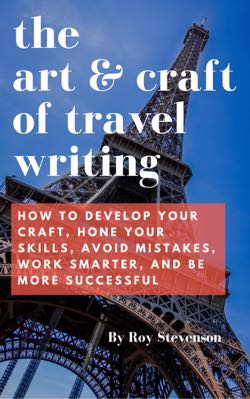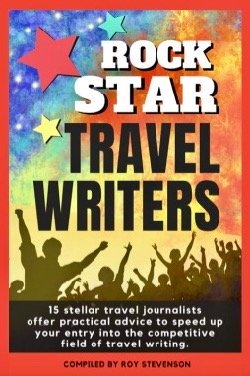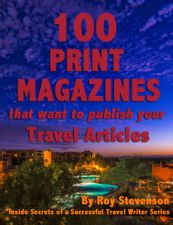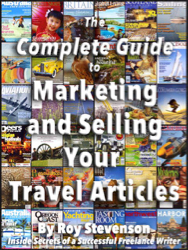Writing FOB Articles:
Are They Worth It?
By Roy Stevenson
Some magazine editors suggest you pitch Front-of-the-Book (FOB) story ideas to break into their magazine. Most travel writing experts will tell you this is a great way to break into a prestigious magazine.
What are front-of-the-book articles? They are very short pieces, usually ranging from 100-450 words. They’re mini-articles.
These short blips usually focus on one small aspect of a travel destination and you can find them in the first few pages of most travel magazines.
Here are a few examples from three popular travel magazines:
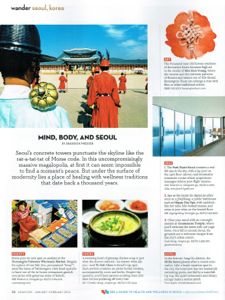
Example from Afar Magazine
One common format shows short descriptions of key points of interest about a place to accompany the photos. In this case, art, dining, spas, hotels and the market in Seoul.
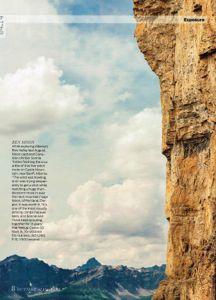
Example from Outside Magazine
This FOB format is a full-page photo with a brief story or description. The story is about the ant-sized person (Sonnie Trotter) hanging off the face of the cliff. Written by the photographer (Ben Moon) who got the shot.
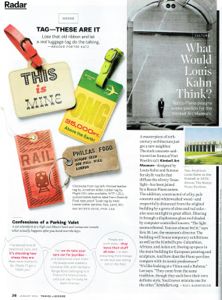
Example from Travel and Leisure Magazine
In this format, two short front of book articles share a page with an ad image of luggage tags. Confessions of a Parking Valet story in the bottom left, and a story about a new art pavilion on the right.
As you can see from the examples, these tasty little hors d’oeuvres could be brief announcements about a new resort that has just opened up in Baja. Or it could tell about a patisserie in Paris that serves delicious chocolate éclairs.
A front of the book article can be about
two new boutique wineries that have just opened in the Napa Valley, or a
trendy new restaurant in Seattle. Or it could highlight a new tour where you can swim with
dolphins in the Caribbean, or an undiscovered museum in Prague.
Why Experts Recommend Writing FOBs
FOB’s generally don’t take too long to write,
and are considered easy pitches to magazines. Editors are
constantly scooping up these short stories to fill the early pages in
their magazines.
There's a reason many editors and travel writing experts
recommend journalists start with front of book stories. It's a low-risk way the editor
can look at your writing before assigning you those
lengthier feature stories that we all yearn for.
Many travel writers have broken into magazines by starting out with front-of-book articles, and some swear by this technique. On the surface, front of book stories would seem to be a great way to get your foot in the door of a top shelf magazine.
FOBs can enable you produce some
quick bylines and parade your name before the editor of higher paying
magazines. And, once you’ve shown what you can do, front-of-the-book
articles may lead to bigger and better assignments with that magazine. At least, that's the idea.
Depending
on the magazine, you'll be paid anywhere from $50-$300 for FOB’s, so
you won’t get rich off doing these short articles. If you’re being paid on the higher end
of the scale it might be worth the time it takes to write the piece.
FOBs Can Be a Waste of Time
My viewpoint is different. I don’t believe front-of-book articles are valuable for a new travel writer. I’ve never bothered pitching them.
Here’s why.
I don’t pitch these short articles because I hate wasting a good feature story in a short 250-word piece. And you don't get paid much!
I also find it frustrating writing short articles. It’s not my style. I
like to paint a more complete picture of my destination rather
than trot out a tiny morsel that people will forget about the moment
they turn the page.
For a while, early in my travel writing
career, several editors asked me to write short blogs and articles akin
to FOB’s. I dutifully wrote them as a favor to the editors who also
happened to be my friends.
And once the editor of a top shelf
military magazine asked me to turn my feature story pitch into a FOB,
which I did. The magazine is considered prestigious in the military
writing arena and I wanted that byline credit.
But, eventually I
noticed I was scrambling around cranking out these short pieces and
they were killing my time. I should have been spending
that time developing longer feature stories and bringing in more money.
So I concluded that FOB’s were distractions, taking up the time I should have been researching and pitching feature stories.
I
also believe that if an editor really likes the story idea in your
query letter, your idea will be accepted for publication as a feature
story. If you’ve got a great story to tell, it won’t matter if you
haven’t written for them before.
Looking
back after ten years of travel writing, I’ve still managed to sell
over 1000 articles to 200 different magazines, newspapers, trade journals,
in-flights, on-boards, and travel websites. Deciding not to pitch front of book articles hasn’t harmed me.
Have I missed opportunities to get my
work published in some prestigious magazines because I don’t pitch these little guys? Maybe, but I don’t regret it.
My focus has always been on
feature articles and I seem to have accumulated plenty of them.
Writing FOBs or Not - What's Your Choice?
So what about you? I’ve presented two sides to the decision to write FOBs - or not. You can consider each approach and decide for yourself.
Am
I recommending that you adopt my maverick approach and forget about
pitching front of book stories entirely? Not at all. This is my personal travel
writing philosophy and business model. FOB’s aren’t in that model.
They’re not my thing.
It's up to you whether you want to
start or enhance your writing career by pitching front-of-the-book articles.
Writing FOB’s has worked for many travel writers, so you shouldn’t discount them. It might be a great way for you to break into the higher paying glossies.
Do you need help writing query letters that catch the attention of editors?
If you're looking for a guide to help you write query letters to editors, I've written The Complete Guide to Query Letters for Travel Writers to help you. It includes everything you need to know about query letters, along with 20 sample query letters that you can use as templates for your own queries.
Related topics that will interest you ...
Using Writer's Guidelines to Sell More Stories
Writing a Query Letter to Sell Your Articles
Getting Published: The Many Ways to Sell Your Articles

Roy Stevenson is a professional travel writer and the author of www.PitchTravelWrite.com. Over the past ten years, he’s had more than 1000 articles published in 200 magazines, trade and specialty journals, in-flights, on-boards, blogs and websites and has traveled on assignment around the U.S. and to dozens of international destinations.
IF YOU ENJOYED THIS POST, GET UPDATES. IT'S FREE.







